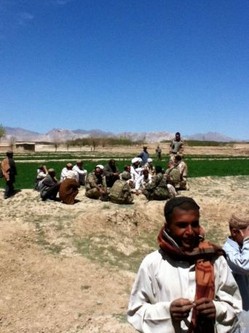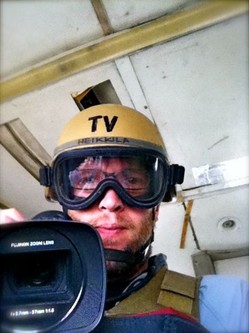As a public television producer, Luke Heikkila recently had the chance to work as an embedded reporter with National Guard troops in Afghanistan.
Heikkila, a member of North Como Presbyterian Church in Roseville, Minn., spent two weeks in April visiting with 22 Minnesota and 36 Mississippi National Guard troops stationed in Zabul province near the Pakistani border. The troops function as the Agribusiness Development Team (ADT), working with the Ministry of Agriculture in Afghanistan.
The embed means that government and military officials were aware of his visit and made arrangements in advance to transport him around with the troops, accompanying them on their mission.
“Non-embedded reporters would have great difficulty going to the places that I went to,” Heikkila said. “I traveled with soldiers, I ate with soldiers, I slept in the same barracks as soldiers, I was, for all intents and purposes, a journalist living with soldiers. I was commonly referred to as a plus one.”
The troops’ goal is to get the Ministry of Agriculture up and running to provide services and assistance to Afghan famers. As part of this mission, the troops visit area villages to talk with elders about their crops and if they’d be interested in receiving information or support from the Ministry of Agriculture.
“That’s a pretty important question to find the answer to, because if they are open to receiving support from the Afghan government, it’s likely that there’s not a very heavy Taliban presence in that area,” Heikkila said. “However, if the farmers put their hands up and say, ‘No, thank you,’ if they’re really not interested, it can be assumed then that in that village there is some Taliban presence, they’ve been visited by Taliban recently or there’s just fear to be seen cooperating or working with the Afghan government.”

National Guard troops visit villages in Afghanistan’s Zabul province to talk with farmers about support available to them from the country’s Ministry of Agriculture. —courtesy of Luke Heikkila
The Taliban influence in some areas is to the detriment of the villagers.
“They are trying to grow crops, and the soil is so poor it must just take tremendous effort to get the ground to produce much of anything,” Heikkila said. “And then to see the farmers deny help from the Afghan government was eye-opening to me to illustrate the powerful hold that the Taliban still has in certain areas.”
Agriculture in Afghanistan is much different from agriculture in the United States, not only because of the infertile soil but also because of the lack of access to water in many villages.
“Water’s an issue. It’s a high desert,” Heikkila said. “In our congregation, North Como Presbyterian in Rose Hill, Minn., we are very much an environmentally focused congregation, and what I walked away with from my experience in Afghanistan was the importance of water.”
Through Earth Day initiatives, adult education classes and personal challenges, North Como encourages members to use fewer natural resources in their daily lives and live a mission that focuses on how to conserve these resources for future generations.
“We are among the first PC(USA) congregations to receive the Restoring Creation Award (2010) and be certified as an Earth Care Congregation by Presbyterians for Earth Care (2010 and 2011),” said Sean Johnson, North Como’s communications specialist.
“What this means is that we are striving to be a carbon-neutral congregation and to help our members, friends and neighbors reduce their carbon and environmental footprint,” Johnson said.
To Heikkila, it was obvious those Afghan villages with access to mountain streams and runoff waters fared much better than those that didn’t. It was especially jarring for the Minnesota native.
“Just about wherever you are in America, you have access to more water than you know what to do with. My family, we come from the land of 10,000 lakes — we can’t drive more than a few miles without seeing a lake or a river or a stream and that’s not the case in Afghanistan.
“We do not face the need to collect every drop of rain that falls on our land. We can go to a faucet for a clean drink of water. In fact, we flush gallons of drinkable water down the toilet every day,” Heikkila said. “Until one sees how difficult life is for so many it is impossible to not take our good fortunes for granted. These are messages that I’m eager to bring back to the congregation at North Como in hopes of allowing us to take pause and appreciate how fortunate we are.”
Heikkila’s footage from the trip will be made into a 30-minute documentary called Bridging War and Hope that will air locally on Twin Cities Public Television and will be available online in September.
“I felt fortunate to be able to travel that far and be able to bring their story back home with me,” Heikkila said of the soldiers from Minnesota, the focus of the trip.
He also gained some insights for himself about the people of Afghanistan.
“Seeing the children and the conditions they were living in is something that’s going to stay with me for a long, long time,” Heikkila said. “I have a couple of children myself and I guess I learned from visiting a girl’s school in Afghanistan that a 7-year-old girl is a 7-year-old girl.”
That’s a message Heikkila shared with the youth group at North Como. He recently showed them some of the video he brought back and asked them to talk about the similarities and differences they saw in the lives of the Afghans on screen and their own. The youth found that ultimately, there were more similarities than differences.
“We’re not that much different from one another, it just comes down to the resources that we have, water being key,” Heikkila said.
In addition to the footage for the documentary, Heikkila kept a blog of his experiences in Afghanistan. More detailed accounts of his time with the troops as well as additional photographs can be found at www.tpt.org/afghanistan.
Toni Montgomery is a freelance writer in Statesville, NC, where she is also secretary for First Presbyterian Church.

